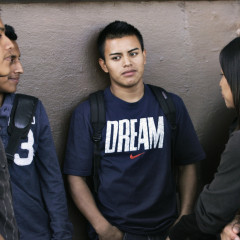Pope Benedict’s surprise announcement took the religion world by surprise, consuming the small space for religion news that most people allocate in their brains.

Young people wait in line for assistance with paper work outside Coalition for Humane Immigrant Rights in Los Angeles.
What’s getting lost? Immigration reform, for one.
Yesterday, the US Conference of Catholic Bishops announced that it will disburse nearly one million dollars toward upcoming immigration reform efforts:
“These grants represent a distinctively Catholic contribution in promoting comprehensive immigration reform. They will strengthen the capacity of our institutions to help immigrant families come out from the shadows and participate more actively in American society,” said Bishop Jaime Soto of Sacramento, California, chairman of the U.S. bishops’ CCHD subcommittee.
Bishop Soto made the announcement March 5, after the members of the CCHD subcommittee determined that swift action by the Catholic community was essential in advancing the recently emerging prospects for immigration reform.
These grants will support efforts to promote immigration reform by Catholic Legal Immigration Network, Inc., an organization founded by the USCCB that supports immigrants’ rights; PICO National Network, a network of faith-based community organizations that works with Catholic parishes across the country; and the Justice for Immigrants Campaign, an initiative of the USCCB that works to educate Catholics on Church teaching about immigration and promote immigration reform.
Also yesterday, former Florida Governor Jeb Bush confused some Republican allies who have promised to work with Democrats on a key provision of immigration reform: a pathway to citizenship.

Jeb Bush greets Pope Benedict XVI in 2005.
Bush, a Catholic and member of the Knights of Columbus, is mulling a bid for the White House in 2016 and he has urged his party to adopt a more inclusive attitude toward immigration and the Hispanic community. He initially advocated for immigration reform that included provisions for the 11 million undocumented immigrants living in the US to be granted citizenship. Then, in a newly released book he co-authored, he appeared to waver on this issue, writing that the undocumented should be granted residency, but not citizenship. Finally, after some questioning from fellow Republicans, Bush reverted to his original position with an important caveat: the undocumented must plead guilty to entering the US illegally and pay a fine before they are granted citizenship.
Why does this matter? Bush’s brother, George, made remarkable gains with the growing bloc of Hispanic voters in 2000 and 2004. Last year, Gov. Mitt Romney steered the GOP hard-right on immigration and paid for it at the polls, with President Obama getting 71% of the vote compared to Romney’s 27%. (President George W. Bush earned 44% in 2004). As Jeb plots his path for 2016, he and other Republicans will need to walk a fine line on this issue, appealing to the nativist fringe of the GOP to get through primary battles while not alienating Hispanics, who now comprise 10% of the total electorate.
And, increasingly, Evangelicals are joining Catholics and mainline Protestants in calling for a more compassionate and inclusive policy on immigration.




